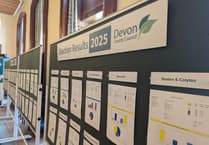Devon’s households are urged to reduce the amount of food they waste after new figures show that over a quarter of ‘black bin’ waste is food, often in its original packaging.
The new figures follow a study of Devon and Torbay residents’ black rubbish bins and coincide with Food Waste Action Week 2023, from March 6 – 12.
Although most Devon residents have a food waste collection, around 28 per cent of the contents of their ‘black bin’ is food. This is such a waste of food and money.
This amounts to 37,000 tonnes of food across Devon and 7,000 in Torbay where 23 per cent is food waste.
And most of this food could have been eaten with a bit of planning and by taking some simple steps.
In Devon 79 per cent of food waste (75 per cent in Torbay) is avoidable – I.e. not like , for example, teabags or peelings – while 44 per cent (25 per cent in Torbay) is still in its packaging.
The study also found large amounts of plastic and paper were being put into black bins, despite that 41 per cent of it in Devon and 58 per cent in Torbay could have been recycled if it had been put into the right kerbside collection bin.
To address this, local people are being encouraged to take advantage of Food Action Week this week to make some simple changes which could save them time and money.
Through their “Win. Don’t Bin” campaign WRAP is offering handy tips and recipe ideas, including checking the fridge before shopping, keeping track of fridge contents, using food before it reaches the use by date, using leftovers, checking the fridge temperature and making a weekly meal plan.
And to support this, through the Devon Authorities Strategic Waste Committee (DASWC), Devon County Council, Torbay Council and their district partners have committed to deliver a range of initiatives to help residents buy only what they need, then use what they buy and ensure any wasted food is put it in the right bin for collection.
Councillor Roger Croad, Chair of DASWC said: “These figures are shocking; it means that in a cost-of-living crisis residents are buying food, and then binning it. Households are wasting up to £800 a year.
“Sometimes it’s past its use by date and they hadn’t noticed, or plans have changed, or perhaps they bought too much food.
“Reducing food waste and making food go further is one area that can help keep household expenses down.
“And if food waste is unavoidable, it is much better to put it the food waste collection for processing into valuable energy and fertiliser rather than throwing it away for costly incineration.
“If all the recyclable waste was recycled it would save £3.9million in Devon and £2 million in Torbay, which could be spent on other much needed services.”





Comments
This article has no comments yet. Be the first to leave a comment.